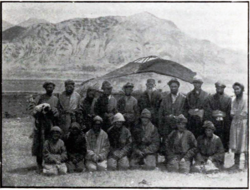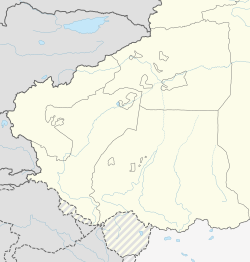Top Qs
Timeline
Chat
Perspective
Dafdar
Township in Xinjiang, China From Wikipedia, the free encyclopedia
Remove ads
Dafdar,[a] also spelled Daftar,[5] is a township in the Taghdumbash Pamir located in Tashkurgan Tajik Autonomous County, Kashgar Prefecture, Xinjiang Uyghur Autonomous Region, China. The township is located near the China–Pakistan border.[1][2] The southern part of the township is located in the Trans-Karakoram Tract claimed by India.[6]
Remove ads
Name
Dafdar means "door" or "gateway" in the Sarikoli language, spoken by Chinese Tajiks.[1]
History
Summarize
Perspective

The area has been used for grazing by various pastoral people in the region for centuries.[8]
During the Qing dynasty, the Chinese claimed suzerainty over the area but permitted the Mir of Hunza to administer the region in return for a tribute.[9] According to British colonial sources, this arrangement started during early Ayosh dynasty of Mir of Hunza, as the Mir conquered the Kirghiz nomads of Taghdumbash Pamir.[10] The Mir erected a cairn in the village to evidence his control. The tribute system continued up until 1937.[8][9]
In 1875, British explorers recorded that Dafdar did not have a permanent settlement, but that it was used a caravan camp on the route between Tashkurgan and Hunza Valley.[11] In the early 1900s, a group of Wakhi settled here with the consent of the Chinese authority.[12][8]
In March 1950, Dafdar Township was established.[1]
In 1959, Dafdar Township became a commune.[1]
In 1966, Dafdar Commune was renamed Xianfeng Commune ('pioneer commune', 先锋公社).[1]
In 1975 in the closing days of the Cultural Revolution, the original name was restored.[1]
In February 1985, Dafdar Commune was made a township.[1]
Emerald deposits were discovered in Dafdar in 2003. These emeralds show similar chemical fingerprints to Afghan emeralds from Panjshir Valley.[13]
Remove ads
Geography
K2, the second highest mountain on Earth, is located in the Trans-Karakoram Tract[6] on the China-Pakistan border in Dafdar.[2]
Dafdar village lies at an altitude of 3,400 m above sea level, just to the east of the Karakoram Highway.[8]
Administrative divisions
As of 2019[update], the township included five villages (Mandarin Chinese pinyin-derived names):[1][2][14]
- Dafdar (达布达尔村)(دەفتەر كەنتى)
- Bayik (Atejiayili 阿特加依里村)(ئاتجەيلى كەنتى)
- Raskam (Resikamu 热斯喀木村 / 热斯卡木村)(راسكام كەنتى)
- Bosit Dokit (波斯特多克特村)(بوسىت دوكىت كەنتى)
- Khunjerab (红其拉甫村)(قونجىراپ كەنتى)
Demographics
In 1997, 89.6% of the population of the township was Chinese Tajik and 10.3% of the population was Kyrgyz.[2]
It is inhabited by Wakhis.[15]
As of the 2000s, there was one mosque in the township and twelve religious professionals.[1]
Transportation
See also
Notes
References
Wikiwand - on
Seamless Wikipedia browsing. On steroids.
Remove ads


